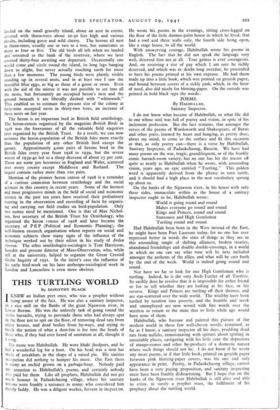THIS TURTLING WORLD
By DOROTHY BLACK
IKNEW an Indian poet once, who was a prophet without being aware of the fact. He was also a sanitary inspector, on a rice mill on the Banks of the great Ngawoon river, in Lower Burma. His was the unlovely task of going round the coolie barracks, trying to persuade those who had always spat on the floor not to spit on the floor, of removing dead rats from under houses, and dead bodies from by-ways, and trying to knock the notion of what a dust-bin is for into the heads of those who, if they had ever heard of sanitation at all, thought it a song.
His name was Habibullah. He wore khaki jhodpurs, and he had a wonderful leg for a boot. On his head was a neat hat made of astrakhan, in the shape of a raised pie. His sinister occupation did nothing to hamper his muse. Out East there is many an orchid grown on a garbage-heap. Nobody paid any attention to Habibullah's poems, and certainly nobody ever paid for them. Like all prophets, Habibullah did not get much honour in Padaukchaung village, where his sanitary notions were frankly a nuisance to many, who considered him merely faddy. He was a diligent worker, fervent in inspection. He wrote his poems in the evenings, sitting cross-legged on the floor of the little dunnee-palm house in which he lived, that had a roof and three walls only, the fourth side being open, like a stage house, to all the world.
With unswerving courage, Habibullah wrote his poems in English. The fact that he did not speak the language very well, deterred him not at all. True genius is ever courageous. And, on receiving a rise of pay which I am sure he richly deserved, and which was ne doubt long overdue, he proceeded to have his poems printed at his own expense. He had them made up into a little book, which was printed on greyish paper, and bound between covers of a sickly pink, which, in the hour of need, also did nicely for blotting-paper. On the outside was printed in bold black type the words: POEMS.
By HABIBULLAH, Sanitary Inspector.
I do not know what became of Habibullah, or what life did to one whose soul was full of poetry and vision, in spite of his inclement profession. But the fact remains, that amongst the verses of the poems of Wordsworth and Shakespeare, of Burns and other poets, learned by heart and hanging, as poetry does, about my mind, to come to the surface and fit this occasion or that, as only poetry can—there is a verse by Habibullah, Sanitary Inspector, of Padaukchaung, Bassein. We have had many poems on the war, tragic, grandiloquent, or of the frankly comic barrack-room variety, but no one has hit the matter off quite as neatly as Habibullah when he wrote, with astounding vision, years ago, an epic entitled " Turtling." This golden word is apparently derived from the phrase to turn turtle, and it should find a high place in the new vocabulary sprung up about us.
On the banks of the Ngawoon river, in his house with only three sides, immaculate within as the house of a sanitary inspector ought to be, Habibullah wrote: World is going round and round Makes everyone go round and round Kings and Princes, round and round Statesmen and High Gentlemen Turtling round and round.
Had Habibullah been born in the West instead of the East, he might have been Poet Laureate today, for no one has ever expressed better in words the state of things as they are in this astounding tangle of shifting alliances, broken treaties, abandoned friendships and double double-crossings, in a world in which no one can say what tune will be next included amongst the anthems of the allies, and what will be cast forth by the end of the week. World is indeed going round and round.
Nor have we far to look for one High Gentleman who is turtling. Indeed, he is the very Arch-Turtler of all Turtlers. So swiftly does he revolve that it is impossible for either friend or foe to tell whether they are looking at his face, or his reverse. Kings and Princes are turtling off their thrones, and are star-scattered over the wide world. The wealthy have been turtled by taxation into poverty, and the humble and meek and unemployed are now wooed with fine words over the wireless to return to the mine that so little while ago would have none of them.
Habibullah, who foresaw and painted this picture of the modern world in those few well-chosen words, remained, as far as I know, a sanitary inspector all his days, prodding dead rats from nullahs, remonstrating with spitters about spitting in unsuitable places, castigating with his little cane the depositors of mango-stones and other by-products of a domestic nature where such things should not be. I do not know if he wrote any more poems, or if that little book, printed on greyish paper between pink blotting-paper covers, was his one and only appearance in print. Poetry, in Padaukchaung village, cannot have been a very paying proposition, and sanitary inspecting must have been frankly disheartening. But I hope that on the banks of the Ngawoon river Habibullah is still alive and able to enjoy, as surely a prophet must, the fulfilment of his prophecy about the turtling world.


































 Previous page
Previous page